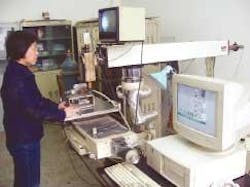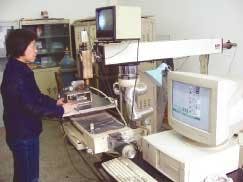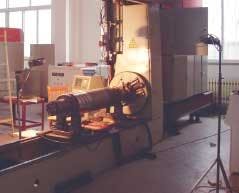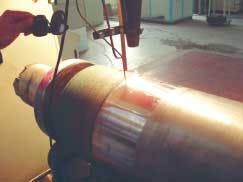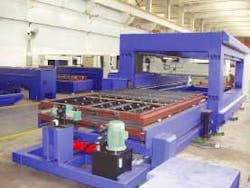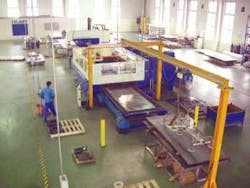China laser job shops
Because of its low cost structure China has become the world manufacturer of a variety of consumer goods that includes textiles/clothing and electrical goods. Automobile and semiconductor manufacturing sectors are advancing rapidly as the domestic technology base increases. ILS has previously featured articles on laser applications research and laser manufacturers in China (January and September 2003). Markers for both domestic consumption and export dominate the number of laser systems in use in China. Thousands of markers are used for decorative marking, labeling, and producing buttons. China is the world's largest producer of buttons.
This article examines the contribution of laser job shops. It showcases how a company builds a successful and expanding laser cladding job shop business in Shenyang. It then discusses the opportunities for both domestic and foreign laser cutting system suppliers and the local demand for systems from both manufacturers and job shops. The demands and needs for different cutting systems are illustrated by the experiences of job shop operators in the Shanghai area.
Shenyang, an old industrial city of seven million, is the capital of Liaoning Province in the northeast of China. Major industries include aerospace, military, textile, and various heavy industries (steel, metal smelting, heavy machinery, and so on). The Institute of Metal Research (IMR), Academy of Sciences—the Chinese equivalent of a national laboratory for material research—is located in Shenyang and there are several universities, with the principal ones being Northeastern University and Shenyang University of Technology.
Professor M. C. Wang ([email protected]), who heads the Laser Surface Modification Laboratory of IMR, has many former students who are active in the academic and industrial sectors using laser processing. Professor Wang carries out laser cladding for automotive and aerospace applications working with the local companies and government enterprises. His facility includes a 5kW CO2 laser (Wuhan Unity Laser Company) and a 400W Nd:YAG laser (Chutian). B. C. Zhang at IMR uses an old 300W pulsed Nd:YAG laser to carry out micro-welding and micro-cutting research and development. Using oxygen assist gas and post cleaning procedures, she has developed a technique to cut high-quality flexible stainless-steel stents. This is an excellent example of what can be achieved with careful process optimization and a hybrid novel technique. The quality of the stents rivals those produced by short-pulsed lasers without post processing. Dr. S. Zhang, a professor at the Shenyang University of Technology, uses a 3kW CO2 laser for laser welding and cladding research.
There are only a few laser job shops in the northern China area. A major and successful one is Shenyang Dalu Group (www.dalujt.com, run by Mr Dong Xia), which consists of five technical and a trading subsidiary companies. The Dalu Laser System and Equipment Co. Ltd., managed by Tao Xing Qi, builds 2- to10kW CO2 lasers using a cross flow design and supplies welding and cladding systems to Chinese companies. The Dalu Laser Technology Co. Ltd., managed by Chen Jiang, uses laser cladding systems developed by its sister subsidiaries to perform repair work for China's heavy industries. The business takes advantage of the local infrastructure of mechanical designs, dynamic balancing, specialty materials, and laser processing research and development offered by various research institutes, IMR, and universities. It targets both local and regional opportunities in repair of high-value components.
Compressor blades used in natural gas fired power generation can be repaired by laser cladding at a fraction of the cost of new replacement blades. Steel mill rollers that are repaired by laser cladding enjoy a longer life. The cladding process is kept simple for cylindrical shapes using a powder feeder and 2 kW of CO2 laser power. Although process speeds are relatively slow (but robust), labor costs are low. After the appropriate buildup of clad layers, the rollers or cylindrical components have to be machined to tight specifications and tested for performance. The Dalu Automation Technology and Custom Testing Co. Ltd. performs these post-processing steps. Hence, the company has an integrated remanufacturing capability.
Dalu Group, which has two-thirds of the laser cladding repair business in China, expects a 40-percent increase in business to RMB$100M in revenue in 2004. In China there are about 200 gas combustion power plants and 13 hot rolling lines with 26 cold rolling lines, so repeat (repair) business is abundant. There are ample opportunities for diversification and growth in the aerospace sector for repair of turbine blades. The 46,000-square meters site with 12,000-square meters of shop floor is more than adequate to handle near-term growth.
Before discussing laser-cutting job shops, it is useful to understand recent industrial development of China. Within the last two decades China initiated a development plan starting with the Pearl River Delta in the south. Products produced there were manufactured and exported through Hong Kong. The success of this development can be seen in the economic and industrial expansion of Shenzhen, which borders Hong Kong. Here the industries were initially relatively low-technology light manufacturing. Laser job shops predominantly use laser marking and more recently laser cutting. The success of the Pearl River Delta development led to the development of the Yangtze River Delta region with Shanghai as the focus. Shanghai, with a population of more than 13 million, is a booming metropolis with an emphasis on finance, high technology, and machinery.
There are about 100 laser cutting job shops in the Pearl River and Yangtze delta regions. Both domestic and foreign manufacturers supply laser cutting systems. Unity Prima (previously Unity Best Choice), a joint venture between Wuhan Unity Laser, Prima, and Shanghai Laser Corp. (www.unity-prima.com), dominates the mid- to low-range market. It is noteworthy that Unity Best Choice started in 2000 with less than US $100,000 in capital and has grown to be the ninth largest laser cutting system supplier in the world. Jian Guo Wu, the general manager, who is well connected with the various Chinese trade and research organizations in laser processing, sees the growth and demand of experienced users for high-end cutting systems and is positioning his company for this market.
Bystronic and TRUMPF currently supply the high-end laser cutting systems being sold. In 2003, Unity Best Choice provided about 50 percent of all the 2D systems sold in China and the rest were shared by other local and foreign suppliers. Last year, several 3D systems were also sold, predominantly by TRUMPF. The major application areas for these cutting systems were packaging machinery, switchgear systems, auto and textile industries, and job shops.
In 2001 TRUMPF built a model job shop (TCN) in Taicang, Jiangsu Province, about 50 km from Shanghai. Many German companies are located in Taicang where the progressive local government has attracted substantial foreign investments. This model job shop operated TRUMPF equipment, a 4kW 2D cutting system, a punching system, bending system, and a grinding system as well as TIG and MIG welding. The model job shop also serves as a demonstration and training center. George Gu, the general manager, comments that TCN runs three shifts/day but does not compete with its customers because of the growing demand for job shop services. In fact TCN helps its customers find work. TRUMPF sales in China are handled by its Shanghai Beijing, Guanzhou and Chengdu offices (www..siberhegner..trumpf.com) headed by Dr. Eva Schwinghammer, managing director of TRUMPF SiberHegner Ltd., a joint venture between TRUMPF and Siberhegner, a Swiss company.
Prior to 2003, most Chinese job shops used 2kW CO2 lasers to cut sheet metal of <15 mm thickness. Now with the demand to process thicker materials faster, cutting systems in the 3- to 5kW power range are in demand. Most job shops run two to three shifts per day, while users with high-end systems typically run three shifts. The experiences of different laser cutting job shops, described below, illustrate the demand for different laser cutting services.
Shanghai BST Electric Works Supply, a company in the east Shanghai area (Nanhui), has been cutting 2mm-thick stainless-steel elevator panels for the past three years. It is not actually a job shop because it uses the laser-cut panels for internal consumption, but its operation is similar to one. The company uses an old Unity Best Choice 2D cutting system with a 2kW PRC CO2 laser. Four employees carry out the work, including programming the CNC, loading and unloading parts, and minor maintenance. The operations manager commented that the growth of the Shanghai area with the increasing number of residential and commercial high-rises has kept the company busy running at least two shifts per day. An occasional job cutting carbon steel is also performed.
Shanghai Hung An Laser Cutting Company is a small job shop that focuses on supporting the printing industry. Plywood panels (die boards) are laser cut and fitted with cutting blades that stamp printed paper or cardboard. Previously, the company used traditional mechanical (bandsaw) cutting, which is slow and limited in flexibility. The company recently purchased a 2D laser cutting system with a 700W CO2 laser (Nanjing Laser Company) to remain competitive. Surprisingly, a good return on investment (ROI) is obtained running only about 1 to 1.5 shifts per day.
Shanghai Linyuan Machine Engineering Co., Ltd. is one of many job shops using the TRUMPF model jobshop concept. Kong Lin Dao, the owner, saw the potential of the TCN concept and invested without prior experience in the use of lasers. His job shop runs three shifts per day cutting parts for heavy equipment, elevators, and textile manufacturing machinery. The operations manager, Ma Ji Xing, did not have much previous laser cutting experience but was still able to go into full production in three months after system installation even with a delay of several months caused by electrical power fluctuation problems.
Shanghai USUN Technology Inc. is run and owned by Li from Taiwan, who has 10 years experience with all major laser cutting systems while he was working in Taiwan. Li commented that prior cutting systems tended to require substantial maintenance and programming skills. Now, systems are much improved and have low maintenance and are easily programmed. His experience is that TRUMPF systems have the lowest maintenance and he has been able to run his Trumatic L3030 system for 15 days continuously. He added that a fast laser power response is needed for high-speed profile cutting and that RF-excited lasers are much better suited for this job than DC-excited lasers. The parent company in Taiwan uses both DC- and RF-excited lasers, and its experience is that the RF-excited systems, at about half the power of the DC-excited ones, generate substantially more revenue. Lee's experience allows him to cut 23mm mild steel with 3.5 kW of laser power. USUN carries out its own system maintenance and uses all TRUMPF optics and nozzles. A local gas company (a German joint venture) supplies all the gases. He emphasized the need for high-quality laser gases for optimal cut quality.
Normal operation of his L3030 system is three shifts per day with three workers per shift and Sunday is down for maintenance. Fifty percent of the cut products are for his company's printed circuit board applications and the rest supplies other Taiwanese enterprises. Even with the local low cost labor, he emphasizes the need for high-end, high-productivity systems and plans to expand his capability with a twin-head cutting system.
The demand for competitive manufacturing and the low cost structure in China provide substantial opportunities for laser cutting system suppliers, manufacturers, and job shops. While many job shops use low- to mid-range systems, system suppliers and experienced job shop operators are aware of the productivity and increased capability of high-end systems with higher laser power to 5 kW. Laser welding of components is increasingly being used by local automotive operations, however, in the opinion of the authors, laser cutting is expected to continue to dominate job shops. System suppliers and job shops should see rapid growth in the Shanghai area with its expanding economic and industrial development.
Keng Leong is an ILS contributing editor and chief technical officer at SiMMTec (Allison Park, PA). H.C. Man, also an ILS contributing editor, is an associate professor and associate director of the Advanced Manufacturing Technology Research Centre and the manager of the Laser Center at the Hong Kong Polytechnic University.
